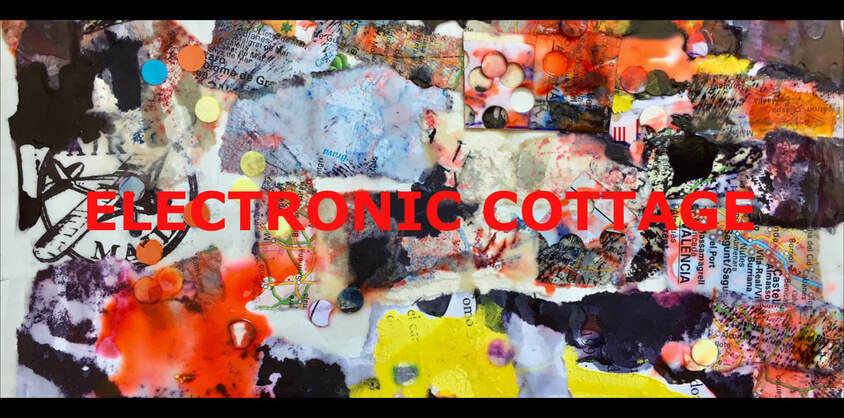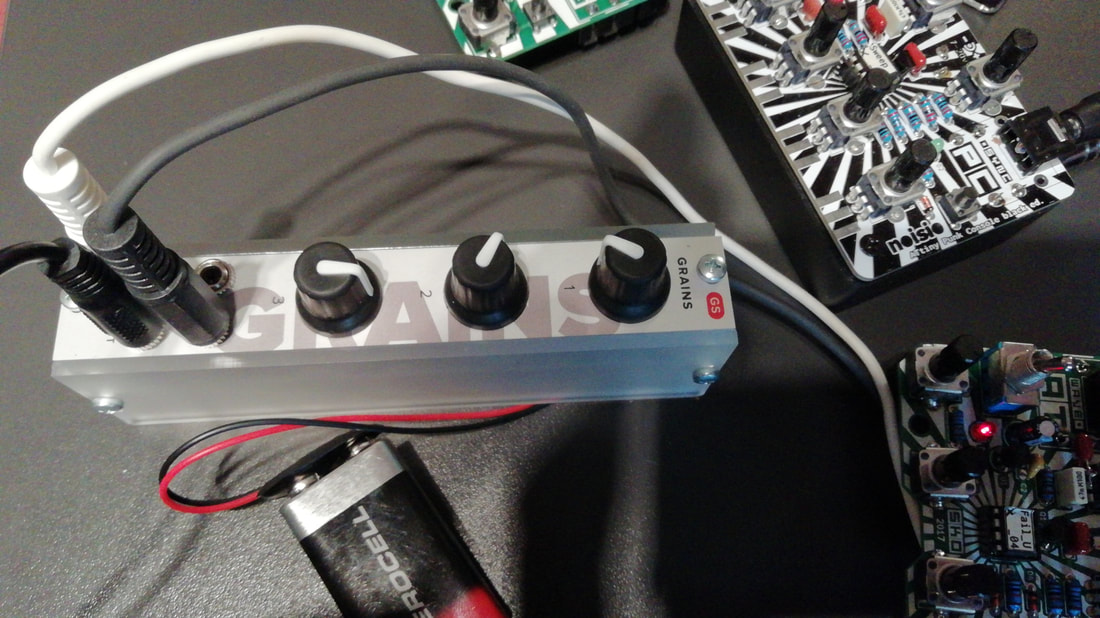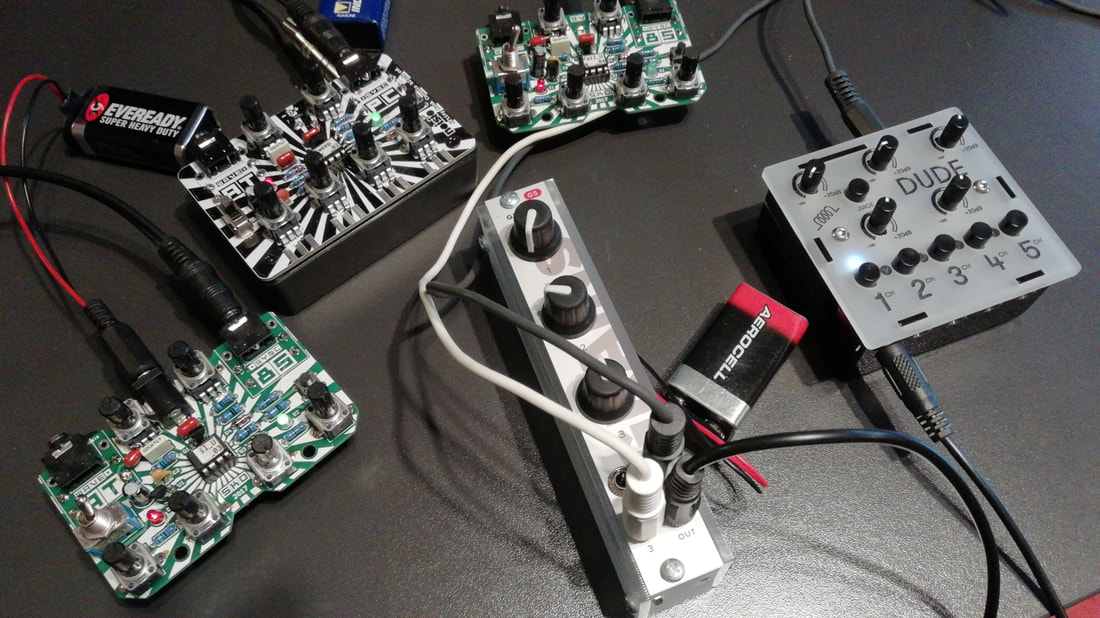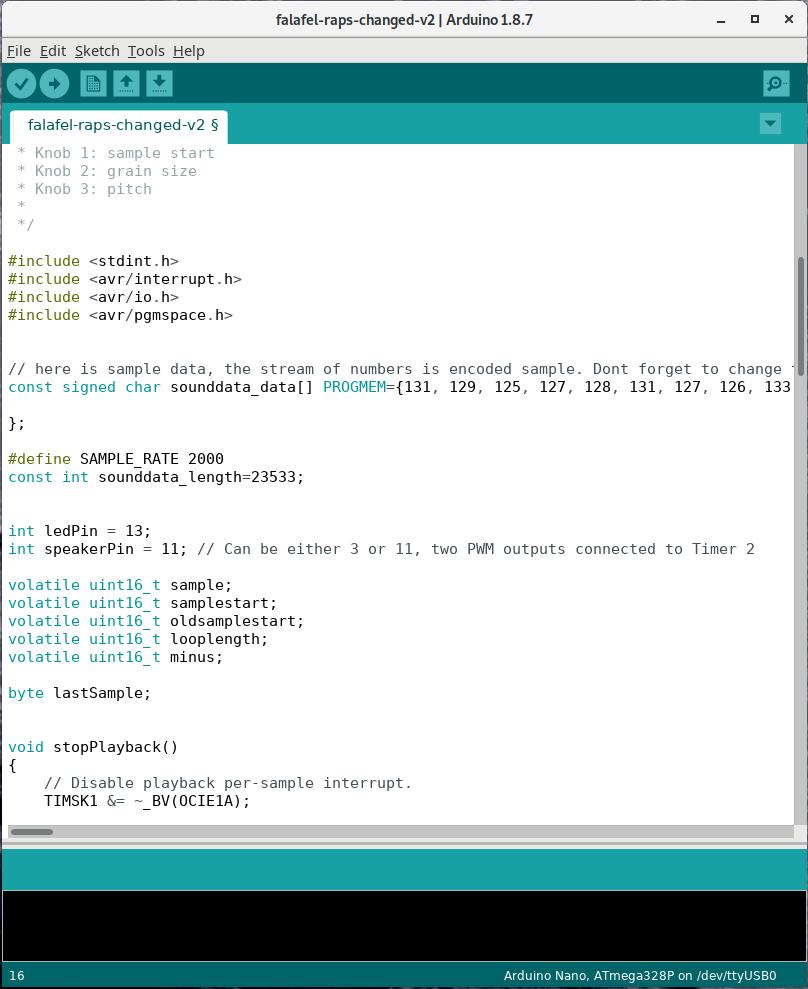|
drkmbnt is an unpushed or hidden project of mine, a kind of lab to produce not clearly defined music with self-soldered sound tools and instruments. The artistic goal is to present a live set as drkmbnt in the near future. Last week I've spent some time with GRAINS developed by Jan Willem Hagenbeek who runs his modular music hardware company Ginko Synthese in Den Haag, The Netherlands. What is Grains? Willem keeps his explanation simple: "This complete and easy-to-build DIY kit Grains is one of the cheapest ways to get a voltage controlled oscillator in your modular and sounds completely different than all other oscillators! It can do minimalistic clicks and plops, screaming leads, fat basslines, weird noises or chiptunes." Grains is a code driven environment based on an Arduino Nano with 3 potentiometers, 3 CV inputs and 1 audio output. You also can add samples to your code - see link. How does Grains v.2 work: CV in1 is routed via potentiometer 1 and safety diodes to Analog input 2, CV in2 is routed via potentiometer 2 and safety diodes to Analog input 1, CV in3 is routed directly to Analog input 3 via safety diodes, Potentiometer 3 is routed directly to Analog input 0 with 5V on one side of the potentiometer and ground on the other. My setup for the music piece "Grains" consisted of: 1x Grains, 3x ATinyPunk Console (ATPC: see edition 3 of this series), 1x Dude (Mixer). It was connected like this: ATPC with "Fail U 03" Sync out into ATPC "Sweep" Sync In. ATPC "Sweep" Sync out into Grains CV in 2. ATPC "Fail U 04" Sync out into Grains CV in 3. The code I used for the tune "Grains" has been coded by Falafulur "falafel-raps-changed-v2 PCB v2". All sounds you hear in this tune are coming out of Grains and the "falafel-raps-changed" code. No effects, no extra granular stuff, no time stretching, just DAW editing. Falafulur added some extra informations to his code: * Granulising samleplayer for GinkoSynthese Grains * Based on Rob Bothofs modification of speaker_pcm arduino example by Michael Smith (http://playground.arduino.cc/Code/PCMAudio) * Finetuned by Leoš Hort (Bastl Instruments) https://www.facebook.com/HRTLmuzik * The basic sample is encoded from Harrogath theme of DIABLO 2 LOD soundtrack for experimentation purposes. * To encode your own sample, download Processing app and take a look here: sample encoding: http://highlowtech.org/?p=1963 Links:
Ginko Synthese: http://www.ginkosynthese.com Grains: http://www.ginkosynthese.com/product/grains/ Write your own code: http://www.ginkosynthese.com/uploads/tracking-lookup-table-creating-code.doc Grains manual: http://www.ginkosynthese.com/uploads/building-manual-v2-5.pdf ATinyPunkConsole: https://noisio.de/blog/attiny-punk-console Dude: https://www.bastl-instruments.com/instruments/dude/ drkmbnt: http://www.base.at/drkmbnt Wolfgang Dorninger Dec. 15th 2018
15 Comments
Phillip Klampe
12/15/2018 21:45:07
It's cool to see continued development with DIY modular. I enjoyed the track and it looks like the Grains would be fun to mess around with samples on. I haven't started a modular system technically, but have several modern synths that incorporate CV now. Thanks for posting.
Reply
12/17/2018 03:28:32
Hi Phillip, thanks for your feedback. I use Grains live a lot. Easy to handle and not that much to carry. The Diy Kit is cheap and if you are a coder you have plenty of possibilties in creative ways. Soldering Grains is not a big thing for a used solderer. 2 hours max.
Reply
Phillip Klampe
12/30/2018 19:02:59
So far I have a Korg MS20 (mini reissue), Roland System 1M module, Roland SE-02, Korg Arp Odyssey module, Moog Voyager RME, Moog Little Phatty, Behringer Model D, Behringer Neutron, DSI Pro 2, DSI Prophet Rev 2 module, Roland JDXA, Make Noise O-Coast. All with varying degrees of CV connectivity. Sadly I haven't had much opportunity to explore the possibilities. Sorry for the slow reply.
Rafael González
12/16/2018 05:53:20
Very interesting and cool! Thank you very much for all the information!
Reply
12/17/2018 03:31:14
Hallo Rafael, thanks for your feedback. Did Grains inspire your for new sound output?
Reply
Rafael González
12/17/2018 06:02:47
Yes, of course my friend!
Lumen K
12/17/2018 12:37:28
Very cool piece. I am impressed that you have dived into DIY and are getting such great results. I enjoy modular, but I have yet to try my hand at building DIY modules.
Reply
12/17/2018 13:07:54
dear Lumen K, thanks for your positive feedback. soldering stuff myself became a passion, but DIY has exposed new entrances for me while making music. It's a mix of reduction in the production process, but it also opens up a deeper understanding of the technical processes behind it.
Reply
Lumen K
12/17/2018 14:30:53
Greetings, Wolfgang. Thank you for your kind and informative reply. You are persuading me to pick up a soldering iron and start doing some electronic music DIY. I actually bought an iron long ago, but I have never used it. My father-in-law has used mine, but I have not! 12/18/2018 10:36:31
Hallo Lumen, yes plug in the soldering iron. Is a lot of fun and you can expand your Monotron's easily with effects and filters.
Reply
Hal McGee
12/21/2018 10:46:25
Wolfgamg, I just listened to your "Grains" track above, in the article, (purely for personal pleasure and not as EC Editor) and enjoyed it very much!
Reply
12/22/2018 05:58:31
Hal, thanks a lot for your positive feedback, it means a lot to me.
Reply
Thomas Park
12/22/2018 15:45:03
It's fun just to listen to the granulated sounds. I like how they give synthetic music a noisy edge.
Reply
2/2/2019 07:06:14
I added a new music piece called "bass drum grains" based on sounds created with GRAINS to the drkmbnt page: http://www.base.at/drkmbnt/bass-grains-by-drkmbnt
Reply
Rob
3/14/2019 19:38:12
Hi, are you able to provide a link to the code you used (falafel-raps-changed-v2 PCB v2) or provide it as a reply. Sadly I cannot find it anywhere.
Reply
Leave a Reply. |
Wolfgang DorningerSoldering is the new hometaping Archives
April 2020
|





 RSS Feed
RSS Feed